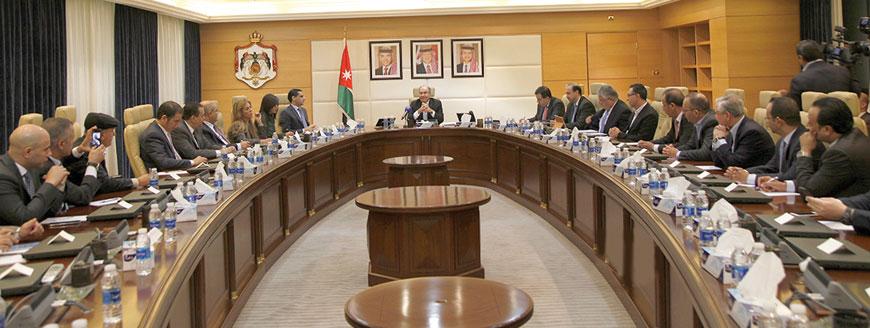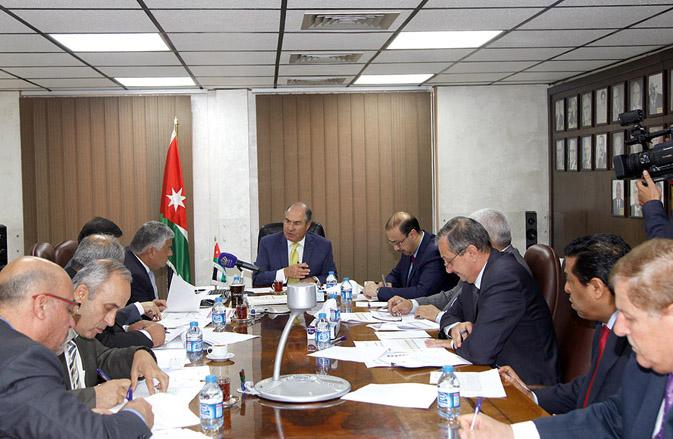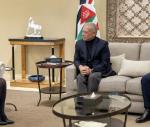You are here
Local elections a milestone in reform process — PM
By JT - Aug 20,2017 - Last updated at Aug 20,2017

Hani Mulki
AMMAN — Prime Minister Hani Mulki on Friday stressed the twin local elections held on Tuesday represent a milestone in the comprehensive reform process in Jordan.
In an interview with Jordan TV's 60 Minutes, Mulki said Jordan managed to hold successful elections under the new municipalities and the decentralisation laws in a "hot" regional situation.
He expressed appreciation for Jordanians who participated in the elections, with a percentage of 31.7 per cent, compared to 24 per cent in 2013.
He commended the Independent Election Commission's (IEC) “professional and transparent” management of the elections and the fact that it started announcing the results 30 minutes after the closure of the ballot boxes, according to Petra.
The premier stressed that the government's efforts, since last year, have led to reducing the municipalities' debt from JD138 million to JD28 million, despite the increase of their spending from JD180 million to JD400 million.
The performance of governorate councils, elected for the first time in the Kingdom’s history, should be monitored, Mulki said, expecting “mistakes as well as achievements”.
Under the Decentralisation Law of 2015, development planning is handled by governorate councils that will be identifying the priorities within a certain budget based on the development requirements, demographics and the essential need of each community needs, Mulki said, adding that next year's general budget will feature governorates’ budgets for the first time.
The prime minister outlined the government's reform-oriented efforts, stressing that the evolutionary reform process involves plans addressing the political, economic, judicial and social aspect of life, along with public sector’s makeover and the quality of services offered to people.
Mulki stressed that stimulating investment, sound management of the public debt and service provision cannot be achieved without developing the public sector. He reiterated, on a different note, that the government would not tolerate any assaults against public employees.
On the government’s relation with the House, Mulki said that MPs’ have become experienced enough to “enrich legislation,” and that the executive branch welcomes their observations and criticism.
As for the economic and fiscal reforms, the premier stressed that such adjustments were not imposed on the government by external parties but are rather home-grown, arising from the need to rectify the situation.
He said that figures of the past five years dictate a programme to remove economic anomalies and restore balance to the economic process.
He noted that the general budget’s deficit and current spending have dropped by 24 per cent and 2 per cent, respectively, despite an increase in salaries by 3 per cent.
The tourism sector has been recovering for political, security and economic reasons, Mulki said, adding that the government has reset the price of electricity for hotels to be the same as for industrial sector and exempted tourists from the departure tax.
The premier said that 86 per cent of the public spending goes to paying salaries, bread and universities subsidies and health insurance. The remaining 14 per cent is government spending, which has been reduced to 11.2 per cent.
After its decision in December to increase or add taxes to commodities, the government left 91 basic commodities untouched to protect the low-and-medium-income segments, according to Mulki.
Revenues obtained from the financial reforms will be allocated to spend on reforming other sectors such as education and health, said Mulki.
Meanwhile, the premier highlighted Jordan’s ranking as the ninth safest country in the world and the second among Arab countries, according to the Gallup 2017 Law and Order survey.
On the increase of unemployment to 18.2 per cent, Mulki said that the government will adopt a new approach to identify the problem to cover all its aspects for accuracy.
The joblessness rate, for example, does not include seasonal jobs, self employment and working for parents, which has increased it by 2 to 4 per cent, according to the premier.
The government has allocated JD25 million for the self-employment programme as part of a plan to encourage Jordanians to adopt enterprises as an alternative to employment in the public sector, the prime minister said, underlining the government’s efforts to increase women’s participation in the labour market.
On foreign policy, Mulki said any changes to the relation with Israel will depend on the developments of its embassy’s incidence, in which an Israeli embassy staffer killed two Jordanians.
He stressed that the government acted promptly and convened 30 minutes after the accident, noting that such issues have to be dealt with carefully to ensure Jordan’s commitment to the international law, as any “hasty” statements would undermine the rights of the Jordanians.
He underscored His Majesty King Abdullah’s directives to follow up on the issue without compromising the rights of Jordanians and insistence that justice should be served.
On the government’s recent decision to raise the price of the governmental advertisement in newspapers from JD.25 to JD.55 per word, Mulki said that his government “did not seek to be praised by the newspapers”.
“If there is a need to increase the governmental subscriptions in newspapers, the government will do that”, Mulki pledged.
Related Articles
AMMAN — The government will go ahead with reforming the sales tax and cash support will be given to citizens entitled to receiving the subsi
AMMAN — Prime Minster Hani Mulki on Tuesday said that he directed budget authorities to immediately start preparation of the public budget 2
AMMAN — Prime Minister Hani Mulki on Tuesday said that 5,125,000 Jordanians will benefit from government financial support after the removal

















